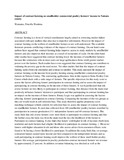| dc.description.abstract | Contract farming is a form of vertical coordination largely aimed at correcting market failure associated with spot markets that arise due to imperfect information. However the impact of contract farming on the welfare of smallholder farmers is not well understood. The available literature presents conflicting evidence of the impact of contract farming. On one hand some authors have argued that contract farming helps improve access to ready markets by smallholder farmers and also improves their incomes as a result of economies of scale.
On the other hand other studies have suggested that contract farming lower the incomes of smallholder farmers because the contractors who in most cases are large agribusiness firms wield greater market power over the farmers. Such studies have even suggested that contract farming can contribute to widening the poverty gap in the rural sector. Yet other studies find that the impact of contract fanning varies from one enterprise and contract to another. This study assessed the impact of contract farming on the income from poultry farming among smallholder commercial poultry farmers in Nakuru County. The contracting agribusiness firm in this region is Kims Poultry Care Centre which deals with a wide range of farmers. The specific objectives for this study were to assess the factors affecting famers' participation in contract faming and to assess the impact of participating in contract farming on the income of these fanners.
It was hypothesized that risk averse farmers are less likely to participate in contract fanning, that distance from the main road positively influence farmers' decision to participate and that participating in contract farming has no impact on the incomes of these farmers. Binary Logit was applied in assessing the factors affecting farmers' participation in contract farming. Comparing the incomes of the two groups as they are would result in self selection bias. This study therefore applies propensity score matching technique (which controls for selection bias) to assess the impact of contract farming on smallholder farmers. It used data collected from 180 smallholder poultry farmers stratified by participation in contract production (111 independent farmers and 69 contract farmers).
The study finds that risk averse farmers were more likely to participate in contract farming and that the further away the farm was from the main road the less the likelihood of the farmer to Participate in contract fanning. It also finds that famers' with higher levels of incomes (both farm non farm) and male farmers had a higher likelihood to participate in contract farming. {:However famers with higher education levels and those who access advice from extension officers were found to be having a lower likelihood to participate.
In addition the study finds that, on average, contracted fanners earned more income per bird compared to the independent farmers and as such participating in contract fanning could improve the welfare of these small holder poultry fanners. On average, participation in poultry production contract increased farmers' net revenue by approximately 27 percent. In addition covariate balancing was checked as well as the sensitivity of the estimated participation effects to unobserved selection bias using the rosenbaum bounds procedure.it finds that even large amounts of unobserved variables.
The implication of these findings is that contract farming can reduce rather than entrench rural poverty as other studies have suggested. Policies which will make it easier for smallholder fanners to participate in contract fanning should be pursued. These include policies that target improvement of rural infrastructure especially roads. The finding that poor fanners were less likely to participate in contract farming calls for policies and strategies that target the inclusion of such farmers in contract production.
Key words: Contract fanning, impact assessment, propensity score matching, poultry farmers, Kenya | en_US |

